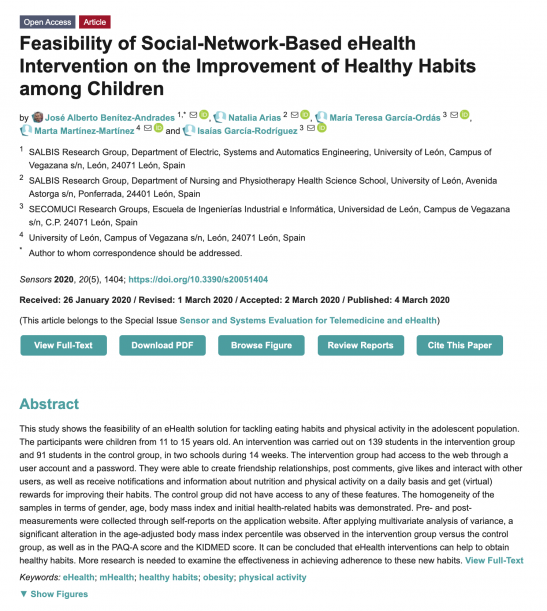Feasibility of Social-Network-Based eHealth Intervention on the Improvement of Healthy Habits among Children
1 SALBIS Research Group, Department of Electric, Systems and Automatics Engineering, University of León, Campus of Vegazana s/n, León, 24071 León, Spain
2 SALBIS Research Group, Department of Nursing and Physiotherapy Health Science School, University of León, Avenida Astorga s/n, Ponferrada, 24401 León, Spain
3 SECOMUCI Research Groups, Escuela de Ingenierías Industrial e Informática, Universidad de León, Campus de Vegazana s/n, C.P. 24071 León, Spain
4 University of León, Campus of Vegazana s/n, León, 24071 León, Spain
* Author to whom correspondence should be addressed.
Sensors 2020, 20(5), 1404; https://doi.org/10.3390/s20051404
Received: 26 January 2020 / Revised: 1 March 2020 / Accepted: 2 March 2020 / Published: 4 March 2020
(This article belongs to the Special Issue Sensor and Systems Evaluation for Telemedicine and eHealth)
This study shows the feasibility of an eHealth solution for tackling eating habits and physical activity in the adolescent population. The participants were children from 11 to 15 years old. An intervention was carried out on 139 students in the intervention group and 91 students in the control group, in two schools during 14 weeks. The intervention group had access to the web through a user account and a password. They were able to create friendship relationships, post comments, give likes and interact with other users, as well as receive notifications and information about nutrition and physical activity on a daily basis and get (virtual) rewards for improving their habits. The control group did not have access to any of these features. The homogeneity of the samples in terms of gender, age, body mass index and initial health-related habits was demonstrated. Pre- and post-measurements were collected through self-reports on the application website. After applying multivariate analysis of variance, a significant alteration in the age-adjusted body mass index percentile was observed in the intervention group versus the control group, as well as in the PAQ-A score and the KIDMED score. It can be concluded that eHealth interventions can help to obtain healthy habits. More research is needed to examine the effectiveness in achieving adherence to these new habits. View Full-Text

